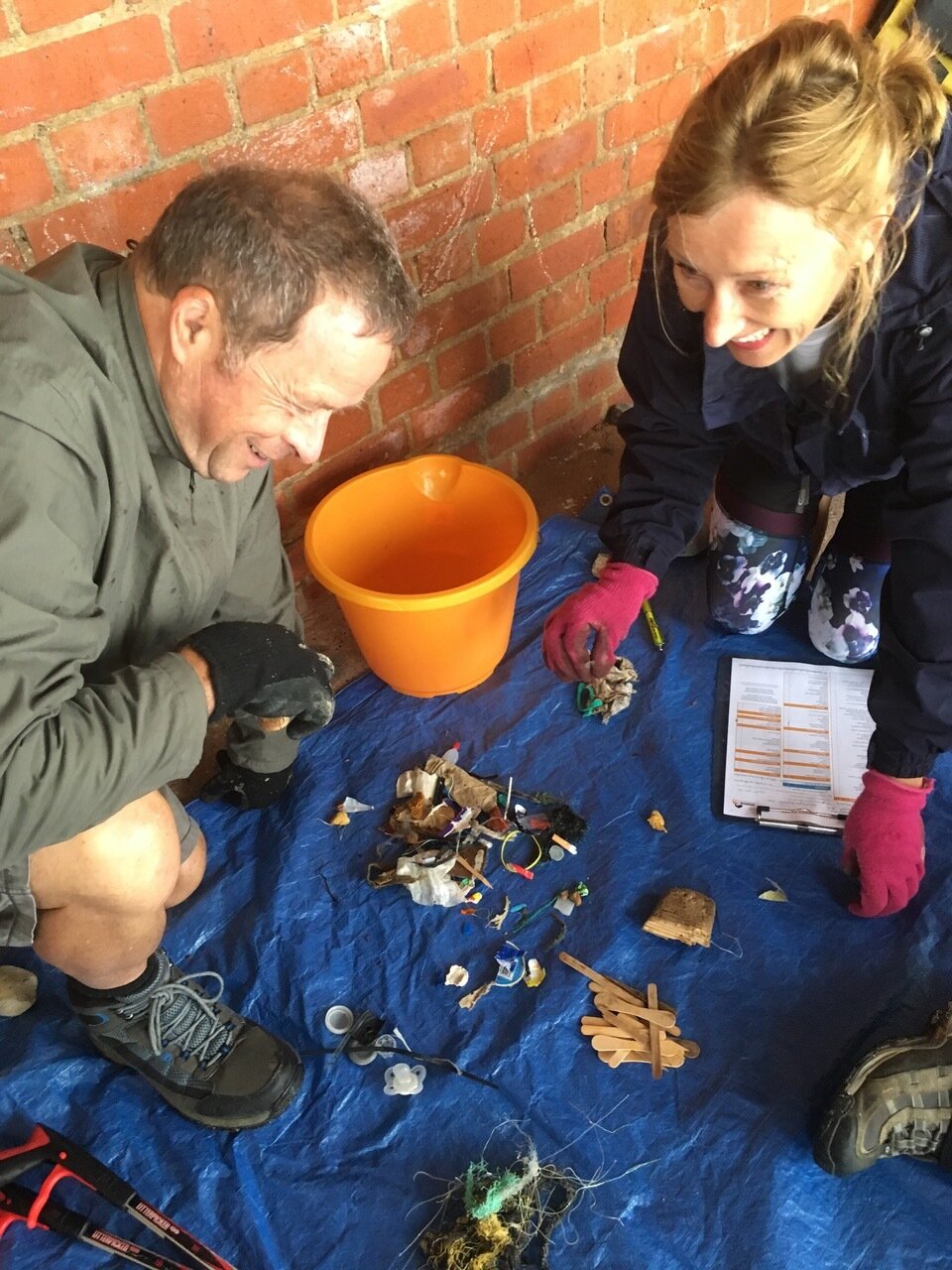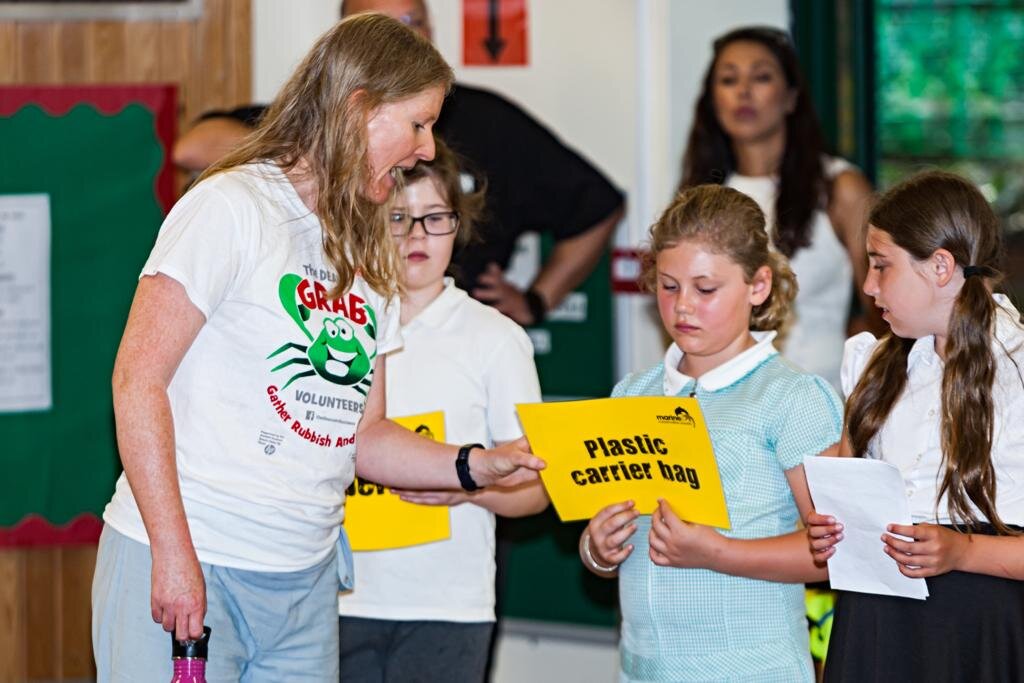Life’s a beach
Hello! My name is Libby.
Since a young child I have always held a fascination for everything outdoors. From tree climbing and exploring the biodiversity that populate the branches to rock pooling and meeting the marine creatures that inhabit them. This led me to care for our environment and create the groups and projects that I have.
I've been cleaning beaches since I could walk! From the ‘West Country’ to The West coast of Scotland, the south coast of Wales to the Eastern beaches of Ramsgate and Broadstairs. But my home of Rottingdean, Sussex, is where I regularly remove debris from our precious environment and focus my effort.
I have always had this passion for nature and I’m a keen hobby botanist and marine biologist and continue to develop my knowledge. I trained as a Montessori teacher and worked for 25 years with children of all ages. teaching through nature before ‘forest schools’ were a ‘thing’. I now work for the NHS in paediatric therapies. I have always loved working with children and their families.
I’m a mum of two boys. One’s at Uni studying Biology and the other’s at secondary school and a Junior sea-champion with the Marine Conservation society, so both are carrying on the journey with me.
Volunteers sorting through their beach debris to add it to a beach-watch survey. It’s a dirty job…but...
Years back I used to clean beaches with friends and family, but noticed that even though our action was amazing it wasn’t enough to make a real difference. So, 8 years ago I decided to start a social media group called The Deans Beach & Environment Volunteers , aka GRAB – Gather rubbish and bag-it!
The aim of GRAB is primarily to clean up our local environment, whilst educating everyone who attends on the dangers that marine debris brings to us and to the fragile marine environment. We love to investigate and teach on the beach about the amazing creatures that live in our Marine Conservation Zone (Beachy head west) and we take part in nationwide surveys to support the research that the Marine Conservation Society and Natural History museum carry out.
I have also had the pleasure of working alongside Sussex Wildlife Trust, Butterfly Conservation UK, Surfers Against Sewage (SAS); where I am recognised as an experienced MCS beach-watch leader. I run surveyed beach cleans which teach and record data to support the lobbying process. All of these charities support my work and I hope I do theirs.
A wonderful group of beach cleaning volunteers!
At GRAB we beach clean in all weathers! This has not deterred our volunteers and our following has grown year upon year. Many subsequent projects have grown with our support; BHCC Tidy up Team, B&H Oceans 8, Pier 2 Pier and Plymouth beach cleaners. We continue to support budding volunteers across the UK that want to make a difference. GRAB is now supported by an amazing group of 8 volunteers known as ‘the Beach Buddies’, who help to run the events that the 100s of community volunteer’s access; the ‘I’ has become a ‘we’ and this is my most proud accomplishment. We do so much varying excellent work that it’s difficult to know where to start…
We run workshops for communities and private companies
My overarching focus is to share, collaborate and to teach all ages and abilities about the great outdoors and how to live in it sustainably. From beach therapy to butterfly transects. I love to learn & teach about all things natural. This led me to found the Beacon Hub Brighton, a community-based eco-classroom on repurposed council land almost 7 years ago. The project continues to be run by a volunteer management team. It’s a wonderful legacy for my community to support and use.
I also run a start-up ECO workshop business (Eco Darling!); supporting communities, schools and other businesses in their journeys to becoming more sustainable and learning about their local natural environment. Within this I run a free consultation service ‘Aunty [anti] Plastics’ focussing on how businesses and individuals can reduce and even eliminate single use plastics. This all keeps me very busy but the sense of goodwill and purpose I feel is huge and that’s what drives me.
I do this because…
80% of pollution enters the ocean from the land, travelling along our water ways, streams and rivers or washing straight off the land into the sea. It effects every bit of the natural environment it travels through, harming and killing creatures, changing the water make up so that creatures of the water cannot breed or breathe. Plastic collects and sticks together, like a unwanted magnet. In the oceans these areas are known as gyres.
The Great Pacific Garbage Patch is located in the North Pacific Gyre off the coast of California and is the largest ocean garbage site in the world. This floating mass of plastic is twice the size of France, with plastic pieces outnumbering sea life six to one.
Here are some plastic facts for you to chew over...
Art from plastic waste collected on the beach!
Over the last ten years we have produced more plastic than during the whole of the last century.
50% of the plastic we use is single use - we use just once and then throw it away.
46% of plastics float (EPA 2006) and it can drift for years before eventually concentrating in the ocean gyres.
It takes 500+ years for plastic to degrade.
Research at Exeter Uni note that a high percentage of teenagers and young adults test positive for BPA in their urine.
Some of these compounds found in plastic have been found to alter hormones or have other potential human health effects.
Each month the Deans Grab Volunteers meet and clean up the mess they find washed ashore upon the beaches of Brighton. This film explores a day in the life of 8 year old Lilah Bachram as she visits Ovingdean beach, to get her hands dirty cleaning the rubbish that we all create. Film by Jo Barker.
We invited super-hero litter pickers to join us in Brighton (Wayne Dixon & Koda) and we visited over 1000 children at schools across Brighton.
This is me teaching at a local school about our wonders of ocean life and the dangers of the plastics we find in it.
We work with Sustrans to try to encourage sustainable travel to our events. On this occasion a bike doctor came to fix bikes on the beach.
Here are my top tips for things you can do to make a difference:
Creating a community art installation – ‘Plastic Spiralling out of Control’
Reuse – e.g. yogurt pots make great plant pots and cut up can be used as plant labels. Reuse when it comes to shopping bags and bottled water. Cloth bags and metal or glass reusable bottles are available locally at great prices and really look amazing!
Refuse single-use packaging, excess packaging & other "disposable" plastics. Carry reusable utensils in your bag, backpack or car to use at BBQ’s or take-away restaurants. Look put for hidden plastics – paper coffee cups are often lined with plastic. Some cardboard packets have a hidden bag inside.
Reduce everyday plastics such as sandwich bags and swap with brown paper/greaseproof paper/plastic free wraps and single use drink cartons by replacing them with a reusable bottle and all of this can be stored in the old faithful lunch bag/box that includes a thermos. Seek out alternatives to the plastic items that you rely on. There are lots of shops that can support you in a #plasticfree lifestyle
Be proactive – always bring your travel mug with you to the coffee or smoothie shop or restaurants, lots of café’s and bars will give you a reasonable discount if you BYO. It’s a great way to reduce lids, plastic cups and/or plastic-lined paper cups.
Recycle as much as you can…as a last resort!
Unwrap – If you really can’t source a product then unwrap at your supermarkets and help educate them in the products you want to buy.
Teach & Learn - Encourage your child’s school to take part in a beach clean/plastic free workshop. Involve your school in actively reducing plastic in the classroom, in the lunch hall and at school events.
Take part- Environmental workshops are everywhere. e.g. ECO Brick workshop – this will help you lock down any plastics you may already have.
Join in - If you live by the coast find your local beach clean team! Our group in Brighton is The Deans Beach and Environment Volunteers @thedeansvolunteers hold monthly beach cleans and occasionally more frequently! Usually the first Sunday of the month at 11am (not too early!)
Spread the word - Talk to your family and friends about why it is important to reduce plastic in our lives and the nasty impacts of plastic pollution.









